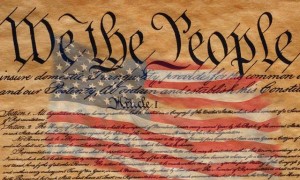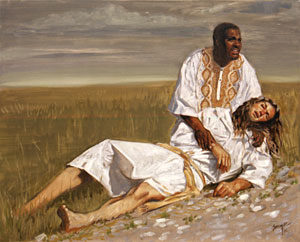A sermon preached by Christopher L. Webber at All Saints Church, San Francisco, on January 20, 2019.Epiphany 2 C January 15, 2019.
Twelve score and three years ago our forefathers and foremothers brought forth upon this continent a new nation conceived in liberty and dedicated to the proposition that all white men were created equal and endowed by their Creator with certain unalienable rights. Looking back with the wisdom of 21st century Americans we can see how limited that vision was, but it was, in its day, a remarkable statement of trust in human reason.
The 18th century had seen an enormous up-welling of human confidence. Isaac Newton and others had begun to map the scientific structure of the universe and the result was a wave of confidence in the power of human reason. They called it “The Enlightenment” and “The Age of Reason” and said it was “the best of all possible worlds.” One leading English theologian wrote a book called: Christianity Not Mysterious.
If you visit New York you can visit St Paul’s Chapel built in that era with its clear glass windows to let in the light of reason and its central pulpit where God is to be explained, not worshiped. Ironically, the Chapel barely survived the impact of the falling towers which had also been designed for a logical world in which religious zealots would not commandeer airplanes and fly them into buildings `on an  irrational religious mission.
irrational religious mission.
Seven score and fifteen years ago Abraham Lincoln was a leading figure in another irrational time testing whether this nation or any nation conceived in liberty could long endure. And now today again we are in the midst of a crisis testing the validity of the founders’ vision and their confidence in the ability of human beings to create a rational and orderly society. What confidence can we have that a few hundred men and women in Washington can make wise and rational decisions when we see irrational actions being taken again and again and the news media calling attention to a world that seems heading increasingly in an irrational direction.
Less than a year ago, the President signed an executive order designed to encourage clergy to endorse or condemn politicians from the pulpit. I myself never felt a need to keep my sermons legal, but it’s nice to have the president’s permission to say what I think about the president. There’s never been a time when we needed it more. It’s a time – I believe it’s a time – when Christians need to apply a Biblical standard to our politics: I think those standards are clear:
“Thou shalt not bear false witness against thy neighbor” Deuteronomy 5:20
“Thou shalt love thy neighbor as thyself” Leviticus 9:17
“You shall not wrong a stranger or oppress him, for you were strangers in the land of Egypt. Exodus 22:21
This is what the Lord Almighty said: “Administer true justice; show mercy and compassion to one another. Do not oppress the widow or the fatherless, the foreigner or the poor. Do not plot evil against each other.” Zechariah 7:9
If anyone has material possessions and sees a brother or sister in need but has no pity on them, how can the love of God be in that person? Dear children, let us not love with words or speech but with actions and in truth. I John 3:17
Whoever oppresses the poor shows contempt for their Maker, but whoever is kind to the needy honors God. — Proverbs 14:31
Jesus said . . . . When you give a banquet, invite the poor, the crippled, the lame, the blind, and you will be blessed. Although they cannot repay you, you will be repaid at the resurrection of the righteous. St. Luke 14:14
I suppose all that is political talk and someone might imagine it would be a violation of the separation of church and state to read those portions of the Bible in church because it certainly does condemn some of our leading politicians, but those politicians are only speaking what their constituents want them to speak and what they elected them to do. So it’s ultimately we who are to blame, we who fall short, we whom the Bible condemns because given the freedom to create our own government we have created a government that gives tax breaks to the wealthy and leaves the poor to fend for themselves
On the day that Jesus began his formal ministry he went into the synagogue in Nazareth and was asked to read, and he read from the prophet Isaiah: “The Spirit of the Lord is upon me, because he has anointed me to bring good news to the poor. He has sent me to proclaim release to the captives and recovery of sight to the blind, to let the oppressed go free, to proclaim the year of the Lord’s favor.”
Now all this might seem to have little to do with the readings this morning . Those readings deal on the surface with marriage. But the marriage in the first reading is a marriage between God and God’s people. and that marriage comes at the end of that very same passage that Jesus read at the beginning of his ministry. It’s the culmination of a picture drawn by the prophet of a people ready for the Lord to come, and those would be people not embarrassed by men and women sleeping on the sidewalks of their cities or building a wall to keep out refugees from violence and despair. Such a people, the prophet tells us, will be a suitable bride for the Lord when he comes – and that’s not us.
So, yes, it’s about marriage: it’s about a people who are ready to be married, married to a God who looks for justice and truthfulness and concern for the least among us, a people who share what some have called “God’s preferential option for the poor,” who understand that the Messiah came first of all to a manger in Bethlehem not an elegant resort in Florida.
Now all of this might still seem to have little to do with the Gospel reading and with that strange story of a wedding feast in Cana, but I think it’s the key not just to this morning’s readings but to our contemporary politics. Pay attention to what’s going on in the story. Pay attention. This is, I believe, the only miracle story in which Jesus is on the sidelines. He’s at a wedding and we all know the bride is the star at a wedding, but this time we would be wrong. This is a first century wedding and the groom is the star. We hear nothing about a bride. Probably there was one, but in those days It was all about the groom. And the groom has messed up. They’re out of wine. And Mary noticed. And Mary mentioned it to Jesus. And Jesus said, quite properly, “Not my problem.” But Mary told the servants, “Do whatever he tells you.” And Jesus told the servants to fill the water jugs and then take that water to the host. So the host, a sort of maitre ’d, gives it a taste and calls the bridegroom and says, “Wow; good stuff; How come you saved it for now when most of your guests can’t tell what they’re tasting?” That’s where the story ends and like any good story it’s open ended. What happened next? We don’t know; we’re never told. But we know something none of the people at the party knew except Jesus and Mary. We know that Jesus saved the day with no one noticing.
Now, the story ends with the words: “Jesus revealed his glory and his disciples believed in him.” It says, “Jesus revealed his glory.” But if I can be allowed to second guess the Gospel, that’s exactly what Jesus did not do. So far as we know the groom never knew what happened. No one knew except Jesus and Mary – Well, and maybe the servants. And some of the disciples who were there because John put it in his gospel and gave it first place in all the stories about Jesus, first place in revealing Jesus glory even though hardly anyone noticed. But isn’t this story important in showing us exactly how God works so often in God’s world: invisibly, unseen, unnoticed. Again and again, the day is saved, and no one knows how.
And isn’t this story vitally important as showing us how God works in the world? The same prophet Isaiah I have quoted already grew frustrated with God at a point and cried out, O that you would tear open the heavens and come down, so that the mountains would quake at your presence– 2 as when fire kindles brushwood and the fire causes water to boil– to make your name known to your adversaries, so that the nations might tremble at your presence! 3 (Isaiah 64:1) Do it the way you used to do, Isaiah begged: “When you did awesome deeds that we did not expect, you came down, the mountains quaked at your presence.” Oh, for the good old days when God spoke and the world trembled.
But that is not generally God’s way; not in Isaiah’s time and not in ours. Just a few weeks ago we were singing, “How silently, how silently the wondrous gift is given.” Yes. We know all this. We learned it in church school The Jews were expecting a Messiah: a conqueror, a semi-divine figure from the clouds, at the least a second David – a warrior, imposing his will. But that is not the God revealed in Jesus Christ. The apostles went up to Jerusalem still expecting great things – and their chosen savior was quickly arrested, condemned, and killed. So much for that. But something else happened, something quiet, almost secret, that worked inwardly, changing hearts and minds, spreading slowly century after century sometimes seeming to be a lost cause but continuing to change human hearts.
Think again of Jesus on the sidelines, sitting quietly with his mother, reluctant to intervene and then doing so in a way that left most of the party-goers unaware. Something like that. So where are we? In the midst of an unprecedented crisis with a president who lies and may be an agent of a foreign power. Isn’t it time for Christians to speak out. Well, yes, but about what? Surely about our own failures to be effective ministers of the gospel of God, unable to heal the wounds on our own doorstep, and wringing our hands about the White House because we don’t see a way through the crisis. We don’t see a way. Nor did the steward at the wedding feast, nor did the bridegroom whose problem was solved before he knew he had one.
The founders thought they could create a government with sufficient checks and balances and rational people could make it work. But people are irrational and the small coins remind us of priorities: “In God we trust.” That’s not rational and I doubt Mr Jefferson or Hamilton would have liked it. But somehow we are still here. Still here, but not by any wisdom of ours. Mr Trump’s father joined the ku kux klan and back in the 1930s the klan met in my small town in upstate New York where there were no black residents and only a few immigrants: the cobbler and the ice cream maker. The only thing we had to fear was fear itself but the fear was real and the danger was great and if somehow we muddled through, it wasn’t any wisdom of ours.
In this irrational world, there was World War II and the Cold War, there were confrontations over Berlin, and there was the Korean War, there was the senseless slaughter of Vietnam, and now, worse  yet, the looming danger of climate change. So far, we’re still here and the government created by rational men to serve rational people has survived the irrational actions of ordinary human beings again and again and God continues to work – invisibly – from the sidelines you might say to draw wine out of water to bring order out of chaos with no better tools than us to work with. God is able to do that; God is able; so say your prayers, do what needs doing, Look for ways that you can be Christ’s unseen hands and Christ’s quiet voice, servants at the wedding feast, quietly, faithfully, letting God act through you.
yet, the looming danger of climate change. So far, we’re still here and the government created by rational men to serve rational people has survived the irrational actions of ordinary human beings again and again and God continues to work – invisibly – from the sidelines you might say to draw wine out of water to bring order out of chaos with no better tools than us to work with. God is able to do that; God is able; so say your prayers, do what needs doing, Look for ways that you can be Christ’s unseen hands and Christ’s quiet voice, servants at the wedding feast, quietly, faithfully, letting God act through you.
Dear Chris, thank you for this. I’ve just read chunks of it to the “athiest” husband who agrees with all his heart with what you say. We so need to have this look back into scripture to find our way, our souls. Love. Lisa